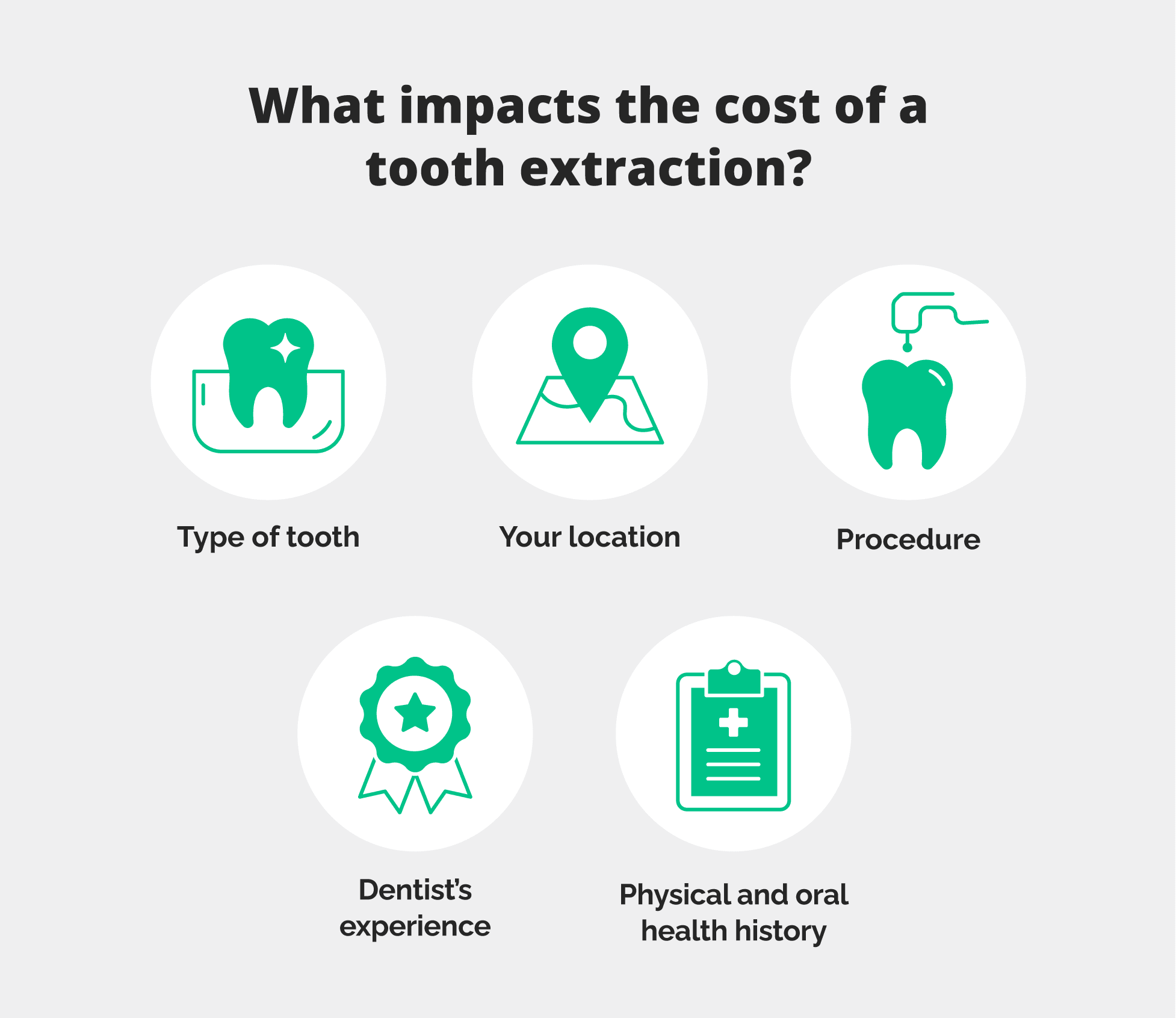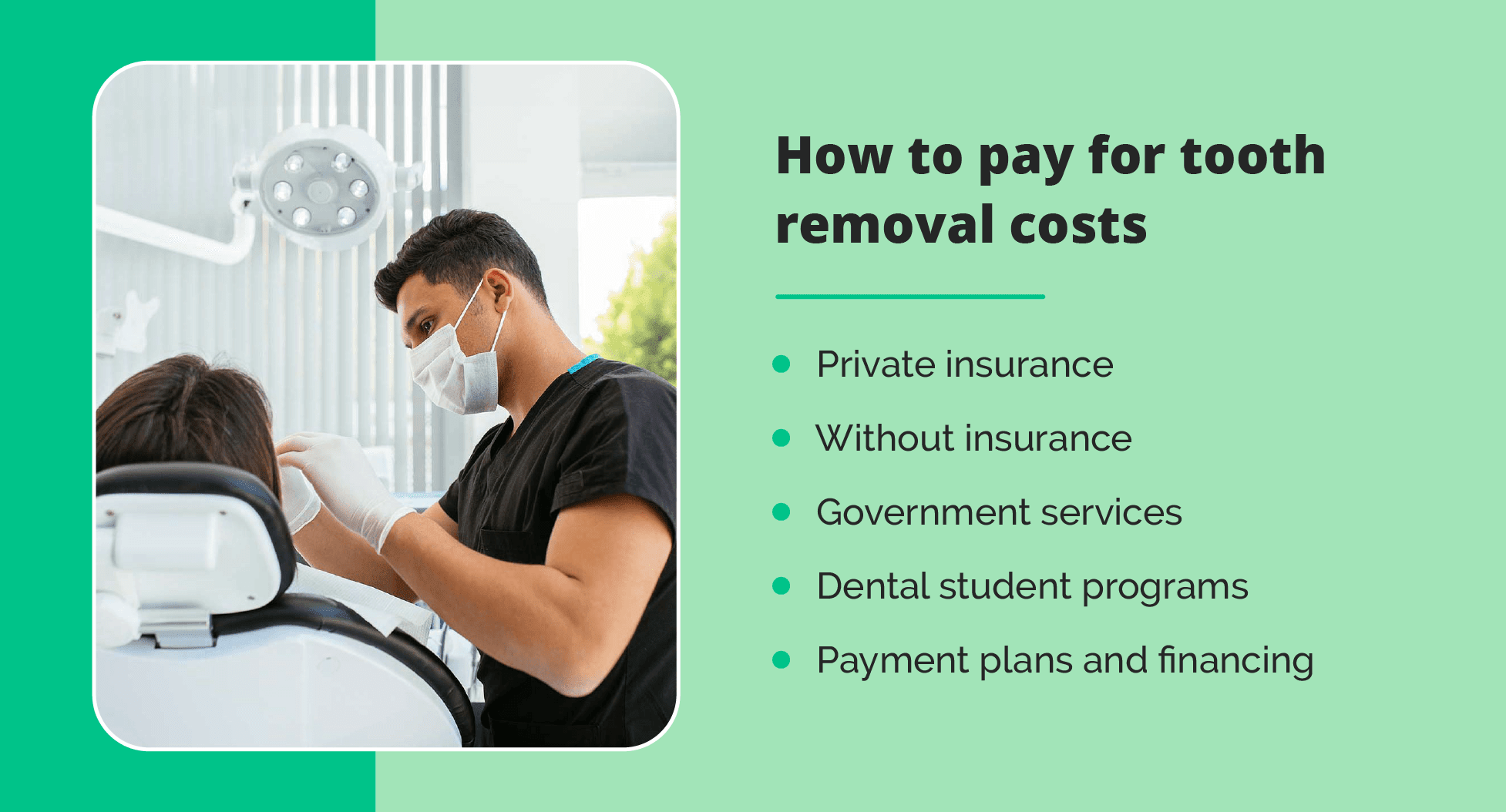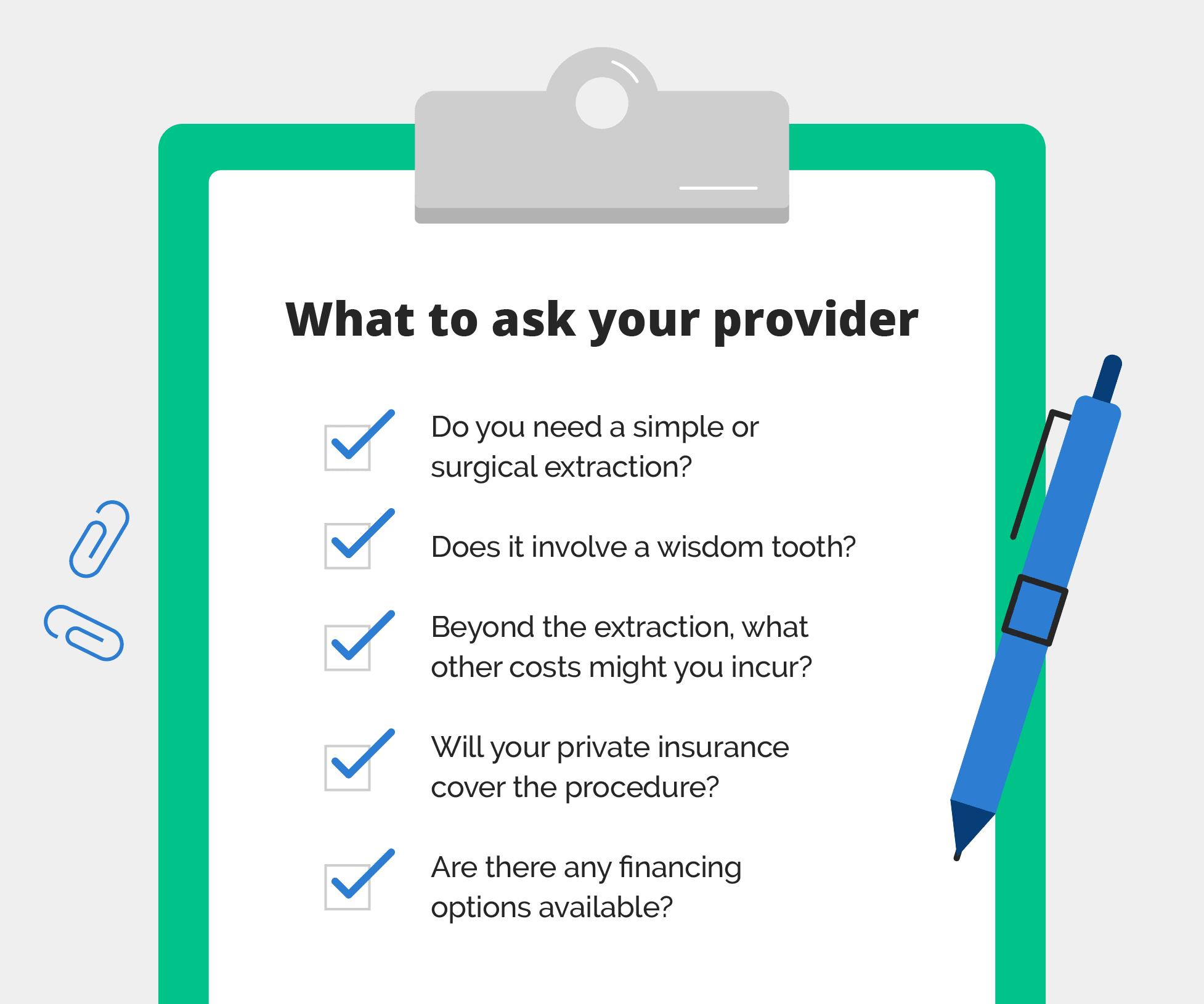
The average cost of a simple tooth extraction in Canada is between $152-$228, while a surgical extraction will fall in the range of $224-$435. Wisdom teeth extractions can be a little higher depending on the type of work involved. Other costs may be associated with your tooth extraction, such as follow-up appointments, x-rays, or prescriptions.
Tooth extractions are not only a crucial component of maintaining oral health, but they are also often a necessity for many individuals. As people in Canada navigate their dental health, a key question emerges: How much do tooth extractions cost? This concern is particularly relevant given the intricacies of dental procedures and the way regional differences can affect these costs.
In this comprehensive guide, we aim to provide clarity on the expenses related to tooth extractions within Canada. We'll examine the intricacies of the procedure and offer insights into the factors impacting the amount a patient pays.
Tooth extraction cost by type
You might have heard an array of stories about tooth extractions, from simple procedures that last just a few minutes to more involved dentist visits. In reality, each tooth's extraction journey is unique, reflecting the specific circumstances and needs at the time of removal.
So, how much does it cost to have a tooth pulled? The answer depends on several factors, including your specific situation, the type of extraction required, and your insurance coverage. This article aims to demystify the process, breaking down the various factors and considerations that influence the cost of tooth extraction.
In Canada, the average cost for a simple tooth extraction varies from $152 to $228 per tooth. For more complex procedures like surgical or wisdom tooth removals, prices can rise, ranging between $244 and $826.
Your province or city can also play a significant role in determining the final bill. For instance, tooth extraction costs in Ontario might be higher than those in rural areas of Alberta or Saskatchewan. This variance in cost becomes even more distinct across different cities. A dental procedure in major cities like Toronto or Vancouver is likely to be pricier compared to smaller cities like Guelph or Kingston.
| Average tooth extraction cost by province | |||
| Simple extraction | Surgical extraction | Wisdom tooth extraction | |
| Alberta | $154 | $279-$304 | Up to $751 |
| British Columbia | $168 | $285-$433 | Up to $452 |
| Manitoba | $202 | $283 | Up to $634 |
| New Brunswick | $153 | $289-$395 | Up to $631 |
| Newfoundland | $228 | $299-$435 | Up to $648 |
| Nova Scotia | $192 | $293-$303 | Up to $826 |
| Ontario | $203 | $292 | Up to $634 |
| Prince Edward Island | $191 | $266 | Up to $649 |
| Quebec | $152 | $244-$320 | Up to $546 |
| Saskatchewan | $167 | $285 | Up to $598 |
| *No data available for Nunavut and Northwest Territories. Pricing does not include consult, radiographs, treatment planning, additional complexity factors. | |||
Simple extraction
Simple extractions are generally straightforward procedures, typically involving teeth that are visible above the gum line and therefore easier to remove. The cost for such an extraction usually ranges from $152 to $228. Keep in mind, that individual requirements can influence the final price. Factors such as the need for an x-ray or a specific type of anesthetic can adjust the overall cost. Ultimately, the primary focus is on ensuring the patient's comfort during the procedure.
Surgical extraction
Surgical extraction is necessary when a tooth is broken at the gum line or hasn't fully emerged. This method, involving a small incision to safely remove the tooth, typically costs between $244 and $435. Each case is unique, so your dentist might customize the procedure to meet your specific needs.
Wisdom tooth extraction
Wisdom tooth emergence is a significant dental event that sometimes presents challenges. These teeth may grow at irregular angles, become impacted, or stay hidden beneath the gum line, necessitating extraction. This often involves surgical techniques such as flap lifting, bone removal, tooth sectioning, or addressing other complexities.
Consequently, wisdom tooth extraction tends to be more expensive, with costs ranging from $294 to $826. As with other dental procedures, additional factors may influence the final cost. Read this article to learn more about the cost of wisdom tooth removal.
Factors that impact cost

In dentistry, the cost of procedures extends beyond the treatment's nature alone. Several critical factors influence the final cost, including the dental clinic's location, the dentist's expertise, the complexity of the patient's case, and other relevant variables.
- Type of tooth extraction: The cost varies depending on the extraction type due to differing procedures and complexities. For instance, simple extractions, involving visible teeth, are generally less expensive. In contrast, surgical extractions, which may require gum incisions or bone removal, are more costly. The complexity of the extraction directly correlates with the price.
- Dentist location: The cost of dental services can vary regionally, influenced by local living costs and fee guidelines established by regional dental associations.
- Dentist’s level of experience: A dentist's experience and specialization significantly impact their fees. Typically, more experienced and specialized professionals charge higher rates.
- Tooth location and type: The position and type of the tooth being extracted also determine the cost. For example, front teeth like incisors, which are more accessible, often have lower extraction costs compared to molars. Wisdom teeth, situated at the back of the mouth and prone to complications like impaction, are usually more complex and expensive to extract.
- Patient’s physical and oral health history: A patient's health history, including any existing health concerns or complications, can affect both the treatment approach and the cost. Patients with a history of conditions like gum disease may require additional care or precautions, which can increase the overall cost of extraction.
Additional costs and procedures
Tooth extractions, like any medical procedure, involve both preparatory and follow-up steps, each incurring specific costs. Here is a detailed breakdown of potential additional services that may be required:
- Consultation: The initial appointment involves the dentist evaluating the tooth, discussing the procedure, and addressing any questions. Some clinics may charge for this visit, with costs typically ranging from $85 to $168, varying by location.
- X-rays: Essential for providing a detailed view of the tooth and adjacent structures, X-rays aid the dentist in precise planning for the extraction. The cost for an X-ray can range from $20 to $38 for a single image, or up to $94 to $217 for a full set of dental X-rays.
- Sedation: Depending on the complexity of the procedure or patient anxiety, various sedation options are available, from mild sedatives to comprehensive methods like general anesthesia. The cost for sedation can vary, starting as low as $26 and reaching up to $125.
- Tooth replacement (dental implants): Dental implants are a popular option if you're considering filling the gap left by the extracted tooth. The cost for this procedure, including implant materials, is separate from the extraction and can cost nearly $6,000. Read this post for more information on the cost of implants.
- Follow-up appointment: Post-procedure appointments are crucial to ensure proper healing. During this visit, the dentist checks the extraction site and addresses any concerns. Some dentists include this cost in the extraction fee, while others may charge separately, typically between $41 and $145.
- Prescription medications: Post-extraction, there may be a need for antibiotics to prevent infection or pain relievers to manage discomfort. The cost of these medications varies and is subject to differences in pharmacy pricing.
How to pay for tooth removal costs

Ensuring financial accessibility for tooth removal is vital, regardless of whether you are insured or paying out-of-pocket. This comprehensive guide outlines various methods to manage these costs, affirming that essential oral care is accessible to all.
Dental insurance
Dental insurance can significantly mitigate the costs associated with tooth extraction. The extent of coverage depends on your policy's specific terms, including co-pays, deductibles, and annual maximums. Be aware that some plans may also have waiting periods for certain procedures.
Without insurance
- For those without insurance, several alternatives exist to manage the financial burden of tooth extractions in Canada:
- Government services: Various provinces and territories in Canada offer dental programs or subsidies, particularly benefiting low-income individuals, children, and seniors. These programs may not cover the entire cost but can provide substantial financial assistance. Learn more in this post.
- Dental student programs: Dental schools frequently offer services at reduced costs, with procedures performed by students under expert supervision. This approach benefits both parties: students gain practical experience, and patients receive more affordable care.
- Payment plans and financing: Understanding the financial constraints some patients face, many dental offices offer payment plans, allowing the cost to be spread over a period. Additionally, some clinics provide financing options, either directly or through third-party lenders, to make treatments more manageable financially.
Frequently asked questions (FAQ)
Can a dentist pull an infected tooth?
Technically, a dentist can extract an infected tooth, but it's not always the immediate go-to solution. In cases of severe infection, swelling or pain may be too intense for immediate extraction. Typically, a dentist will prescribe antibiotics to manage and reduce the infection first.
Once the infection has subsided, the dentist can evaluate whether extraction or an alternative treatment, like a root canal, is more appropriate. Properly addressing dental infections is crucial to avoid serious health complications. Following aftercare instructions is imperative, especially if an extraction is performed on an infected tooth, to ensure proper healing and prevent further issues.
Root canal vs. extraction: Is it cheaper to just remove the tooth?
When comparing a root canal to tooth extraction, the latter is generally less expensive.
However, the decision should not be solely based on cost. A root canal procedure preserves the natural tooth, whereas extraction entails its removal.
Following extraction, options like dental implants, bridges, or dentures may be necessary to fill the gap, potentially increasing the overall expense. It is critical to consult with your dentist to determine the most suitable option for your oral health and financial situation, considering both immediate and long-term implications.
How much is a tooth extraction in Canada?
The cost of tooth extraction in Canada varies depending on the type of procedure required. On average, a simple extraction can cost between $152 and $228. In contrast, more complex surgical extractions generally range from $244 to $435. Wisdom tooth extractions can cost over $800 in some provinces. Learn more about their cost here.
It's important to note that these figures are approximate. The actual cost can differ based on multiple factors, including the specific extraction method, the dentist's expertise and geographic location, and whether you have dental insurance coverage. For the most accurate estimate, we recommend contacting your dental office directly.
What to ask your provider

Knowledge is power when it comes to any dental procedure. Having the right questions ready can significantly help during your dental consultation.
Consider discussing these essential points with your dentist:
- Clarify the type of extraction: Do you need a simple or surgical extraction? Which tooth needs to be removed? Each comes with its own set of procedures and costs.
- Understand all costs: Beyond the extraction, what other costs might you incur? Think consultations, x-rays, sedation, and follow-up appointments.
- Insurance and payment plans: Will your insurance cover the procedure? If not, are there financing options available?
Prioritizing your oral health means being well-informed about your treatment options and the associated costs. Take time to gather all necessary information to make the most informed decision. And remember, when in doubt, don't hesitate to reach out to professionals for guidance.
Sources:
- Alberta Dental Association
- British Columbia Dental Association
- Nova Scotia Dental Association
- Manitoba Dental Association
- New Brunswick Dental Society
- Newfoundland and Labrador Dental Association
- The Dental Association Of Prince Edward Island
- Ontario Dental Association
- College of Dental Surgeons of Saskatchewan
- Association Des Chirurgiens Dentistes Du Québec
- National Library of Medicine
The content provided in this article, including text, graphics, and referenced material, is intended for informational purposes only and is not a substitute for professional dental advice, diagnosis, or treatment. Always consult with your dentist or another qualified oral health professional for questions regarding your dental condition. Never disregard professional dental advice or delay seeking it based on information from this article. If you believe you have a dental emergency, contact your dentist, or seek immediate assistance from an oral healthcare professional.



